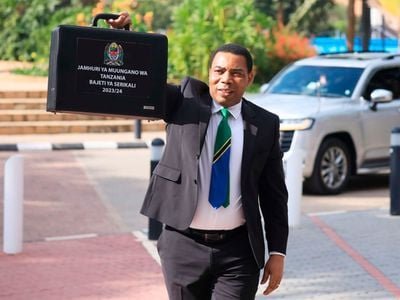
Tanzania’s Finance Ministry has proposed a Tsh49.34 trillion ($19.35 billion) budget for the 2024/2025 financial year, an 11 percent increase from the Tsh44.4 trillion ($17.41 billion) in 2023/2024.
A big chunk of expenditure is expected to go the elections and preparations for the 2027 Africa Cup of Nations (Afcon) finals, which Tanzania is hosting jointly with Kenya and Uganda.
According to budget guidelines announced by Finance Minister Mwigulu Nchemba this week, recurrent spending will go up to Tsh33.55 trillion ($13.15 billion), from Tsh29.17 trillion ($11.44 billion) in the current fiscal year, as the government prepares for local government elections in October and the 2025 general election.
Read: Write up for Afcon 2027 joint preparedness resolved
Part of the proposed Tsh15.78 trillion ($6.19 billion) development spending budget, which has gone up from Tsh15.21 trillion ($5.96 billion) in 2023/2024, will be allocated to renovating existing stadia and building new ones ahead of Afcon 2027, Mr Nchemba said.
Other priority areas of government expenditure in 2024/2025 will include key infrastructure projects and social services, including subsidised public education. Final figures for each allocation will be detailed in the proper budget presentation in June.
According to Mr Nchemba, financing of the new budget will be based 70.1 percent on a domestic revenue target of Tsh33.26 trillion ($13.04 billion), a 10 percent increase from 2023/2024 when expected domestic income was Tsh30.23 trillion ($11.85 billion).
Domestic and external non-concessional loans are expected to yield Tsh9.6 trillion ($3.76 billion), a 27.4 percent increase from Tsh7.5 trillion ($2.94 billion), while income from external grants and concessional loans is set to drop from Tsh5.46 trillion ($2.14 billion) in 2023/2024 to Tsh5.13 trillion ($2.01 billion).
Mr Nchemba said the government would place more focus on its efforts to increase domestic revenue collection as the most reliable way of paying for budget expenses without having to comply with negative conditions.
Efforts to achieve this will include tightening Tanzania Revenue Authority systems to collect more revenue.
The government will also invest in productive sectors that can offer «quick-win» solutions towards expanding the tax base and continue with measures to formalize the informal business sector and block tax evasion loopholes, including by improving controls at one-stop border posts with neighbouring countries, the minister said.
He added that the government planned to push for more public-private-partnership arrangements «to help reduce the burden it has to bear in continuing to finance development projects in the way people have become accustomed to










